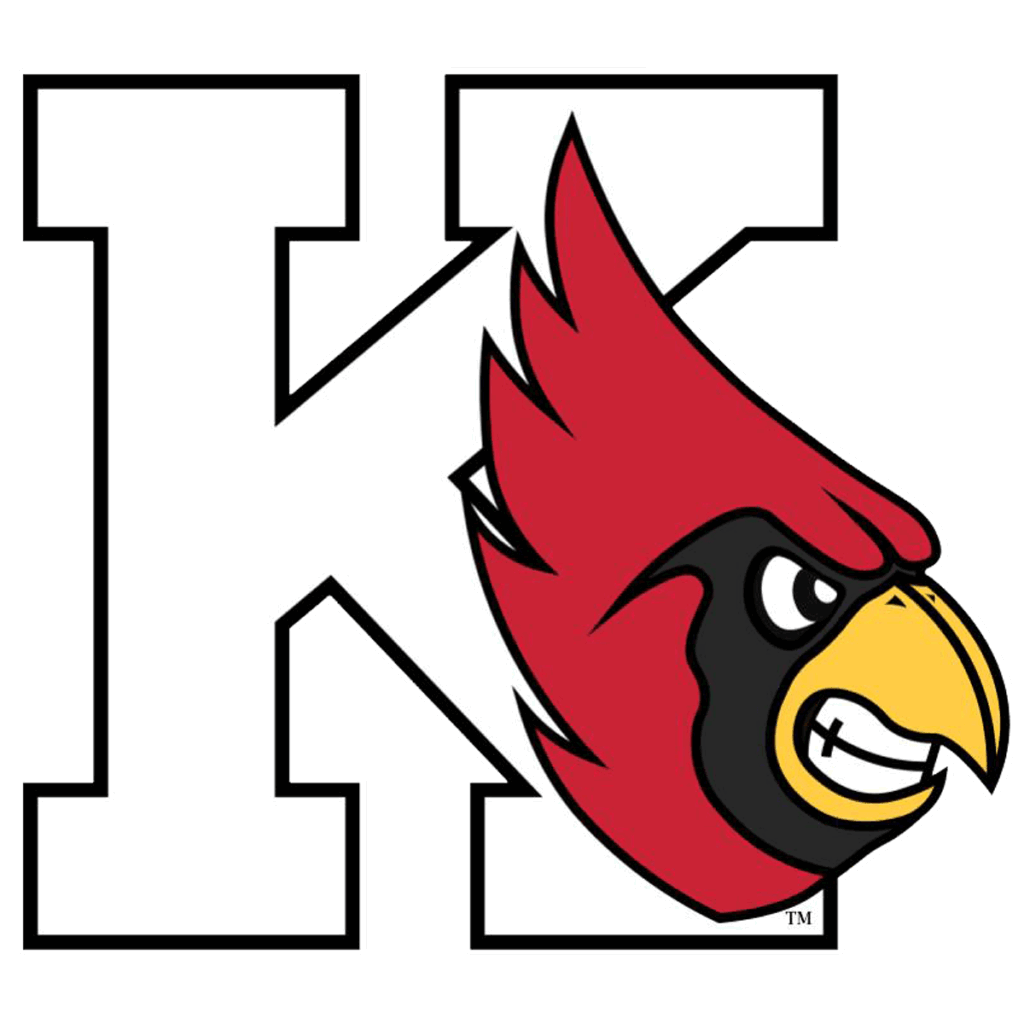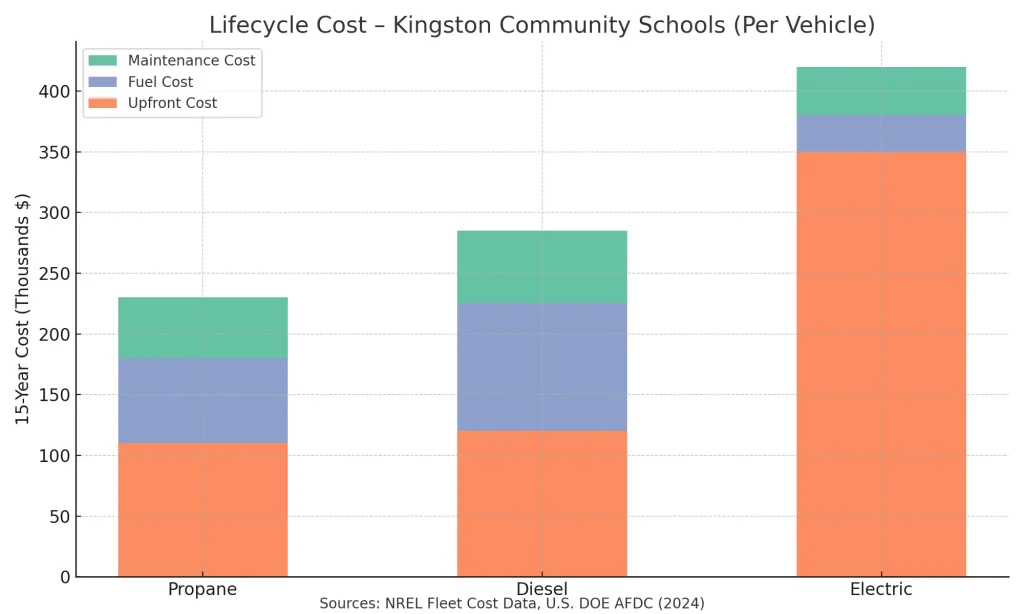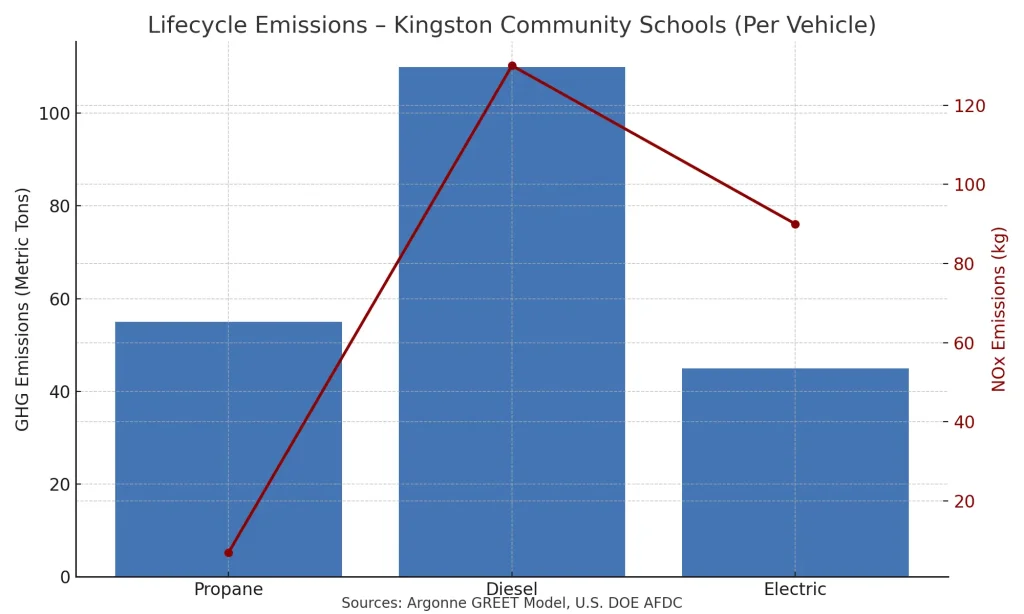Kingston Community Schools Achieves Bus Fleet for Cleaner, Smarter Transportation

Kingston Runs on Propane
- Propane School Bus Fleet – 6
- Daily Routes – 100% Propane
- Savings: Fuel Costs (62% savings over diesel)
- Serving – Approx. 630 Students
Kingston Community Schools is leading the way in clean, reliable school transportation in Tuscola County. As of the 2023–2024 school year, the district operates a 100% propane-powered school bus fleet, offering significant savings and dramatically lower emissions compared to diesel.
Kingston may be a small rural district, but it has led the way in a clean, low-cost transportation program, outshining other school districts. Their buses average 13,000 miles annually and serve approximately 630 students in their district.
As the district officially announced, the move reflects a deep commitment to sustainability, fiscal responsibility, and student health.
A Smart Economic Move
Since 2023, Kingston has featured six propane-powered school buses in their fleet. Shona Vennevy, Kingston’s Superintendent, reported to the Michigan Propane Gas Association in a recent interview their annual savings and areas where they save the most.
“Overall, annually, we are saving about $15,000-$20,000, and the biggest saving would be the cost of fuel. We were able to lock in a propane low price/gallon, and we don’t have that much maintenance because we lease.”
Propane buses also eliminate the need for expensive diesel DEF treatments and other fuel additives, thereby reducing long-term maintenance costs and making it easier on mechanics.
“I love propane school buses because they are cleaner for the air, quieter for the drivers, and quieter for the community.”
Shona Vennevy, Kingston Superintendent
Cleaner Air for Students and the Community
Propane is a low-carbon, nontoxic alternative fuel that does not contaminate the air, soil, or groundwater. It is the world’s third most common transportation fuel, behind gasoline and diesel, and is considered an alternative fuel under the Energy Policy Act of 1992.
The environmental benefits of propane are clear. According to a study by West Virginia University, propane buses reduce harmful nitrogen oxides (NOx) emissions by 96% compared to diesel buses. NOx pollution is a known trigger for asthma and other respiratory illnesses, especially dangerous to young children.
Kingston estimates an overall 30% reduction in greenhouse gas (GHG) emissions district-wide after the transition. Shona reported, “We are saving over 25,000 pounds of CO2 annually with our propane buses versus diesel.”
Beyond emissions, propane buses run quieter than diesel models, helping to reduce noise pollution in the community.
A Safe Fuel
Propane-powered vehicles are safe for drivers and their passengers. There are over 700 propane-powered school buses on the roads in Michigan, with more than 40 school districts utilizing this clean and reliable fuel. Fuel tanks on propane vehicles are 20 times more puncture-resistant than those on gasoline and diesel units. Propane school bus fuel tanks are constructed from carbon steel, in accordance with safety codes established by the American Society of Mechanical Engineers, ensuring durability and reliability for student transportation.
Propane fuel has a narrower flammability range than gasoline and diesel, therefore reducing the risk of accidental ignition. Additionally, every onsite propane fueling station is equipped with a lock-off valve that automatically stops the flow of propane if a pressure drop is detected anywhere in the system, providing an extra layer of safety for school fleets.
The Easy Transition Away from Diesel
Transitioning a fleet to propane is relatively easy over many fuels available.
Melissa Delong, Kingston’s Transportation Director, and Vennevy both reported that the transition to propane was easy, from the infrastructure to the fueling. Delong stated, “To fill the [propane] bus, it’s super easy. All of our bus drivers got trained in fueling.”
Most schools contact their local propane company to procure a propane contract and have a propane storage tank installed on-site. However, there are other fueling options available to schools, such as public fueling stations and mobile fueling services. There’s some training involved in safely refueling propane buses, but overall, it’s relatively easy, as Delong mentioned.
When asked if there was any difference between diesel school buses versus propane school buses, Delong responded, “There is not a lot of difference between both buses [diesel v. propane]. Diesels are louder, propane’s quiet. Other than that, they [propane school buses] run smoothly and great!”
Reliable and Ready for Michigan Winters
Kingston’s propane fleet starts reliably even in cold Michigan mornings, without the need for costly engine block heaters or backup generators compared to diesel and electric school buses. Their operational simplicity translates into better uptime and safer rides for students.
Delong stated in an interview with the Michigan Propane Gas Association, “They warm up a lot faster than diesel, there is no wait time, and they perform fantastically on the roads.”
While the district maintains three diesel buses as backups, all daily routes are now handled by propane-powered school buses.
$6,000 Available from the Michigan Propane Gas Association
With budget constraints and a big push to transition Michigan’s fleets to cleaner fuels, the Michigan Propane Gas Association is here to help. The MPGA is offering fleets up to $6,000 to help them immediately reduce their carbon footprint with their propane vehicles. The MPGA has experts to help fleet managers, treasurers, and superintendents make the transition as smooth as possible.
Learn more at: MiAutogas.com/#funding


